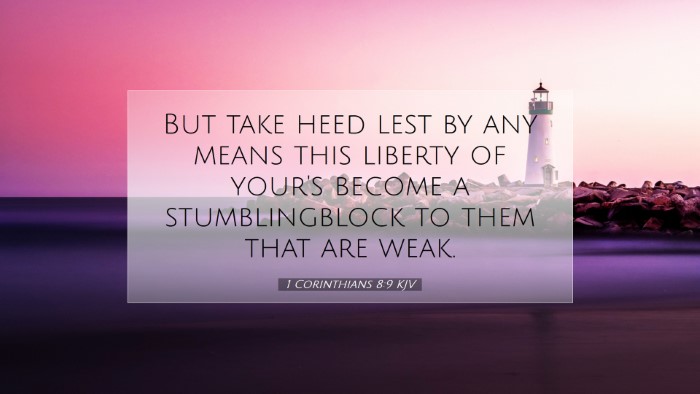Old Testament
Genesis Exodus Leviticus Numbers Deuteronomy Joshua Judges Ruth 1 Samuel 2 Samuel 1 Kings 2 Kings 1 Chronicles 2 Chronicles Ezra Nehemiah Esther Job Psalms Proverbs Ecclesiastes Song of Solomon Isaiah Jeremiah Lamentations Ezekiel Daniel Hosea Joel Amos Obadiah Jonah Micah Nahum Habakkuk Zephaniah Haggai Zechariah Malachi1 Corinthians 8:9
1 Corinthians 8:9 KJV
But take heed lest by any means this liberty of your's become a stumblingblock to them that are weak.
1 Corinthians 8:9 Bible Commentary
Commentary on 1 Corinthians 8:9
Text of the Verse: "But take heed lest by any means this liberty of yours become a stumbling block to them that are weak."
Introduction
The verse 1 Corinthians 8:9 serves as an important reminder about the use of Christian liberty and the potential consequences it has on the faith of others within the community. The Apostle Paul, writing to the Corinthian church, addresses the tension between knowledge and love in the exercise of Christian freedom.
Theological Significance
Understanding this verse requires a thorough examination of Christian liberty as well as the responsibilities that accompany it. Paul emphasizes the ethical implications of using one's freedom in Christ, specifically advising caution to ensure that one’s actions do not lead others into spiritual peril.
Commentary Insights
-
Matthew Henry's Take:
Matthew Henry notes that while knowledge is valuable, it must be tempered with love. He highlights that the freedom believers have should not be exercised at the expense of weaker members of the faith. This principle teaches that our liberties must be considerate of others' spiritual conditions.
-
Albert Barnes' View:
Albert Barnes suggests that the 'liberty' mentioned refers specifically to the freedom to eat food offered to idols—a common issue in Corinth. He indicates that this freedom should not lead to temptation for those who are weaker in their faith. He intricately ties the exercise of liberty to the communal nature of the Christian faith, emphasizing that actions taken without caution could negatively influence others' relationship with Christ.
-
Adam Clarke's Perspective:
Adam Clarke elaborates on the phrase "take heed," indicating that this is not merely a suggestion but a necessary warning. He emphasizes self-reflection amongst believers: considering whether their actions may inadvertently lead a younger or less mature believer to stumble. Clarke’s commentary focuses on the need for humility and the application of love in the context of Christian teachings.
Practical Applications
-
1. Responsible Freedom:
Church leaders, as well as congregants, should thoughtfully consider how their personal freedoms affect the wider community. The guideline here is to always act with love and concern for others.
-
2. The Role of Love:
Love must govern our actions, significantly when those actions could lead others to stumble. Knowledge is important, but it must be applied within the framework of love, impacting how freedom is navigated in communal worship and interaction.
-
3. Seeking Unity:
This verse calls the church to promote unity rather than division, urging believers to prioritize communal strength over personal liberty. Scholars note that fostering an environment that encourages spiritual growth is vital; hence, humility in exercising one's freedoms is crucial.
Conclusion
1 Corinthians 8:9 encapsulates a core aspect of Christian ethics—the intersection of personal liberty and community responsibility. For pastors, students, theologians, and scholars, this verse serves as a critical reminder not to exercise freedoms without regard for those who may be affected by our choices. It is an invitation to love intentionally, nurturing faith within the body of Christ and ensuring that our actions build up rather than tear down.


